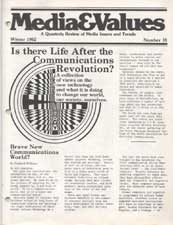Technology is Only a Tool
|
This article originally appeared in Issue# 18
|
With my 'electronic lapel pin" blinking away on my jacket, I picked up the file of materials I had been gathering for this issue of Media&Values.
Evidence of the technology I'm reading about are all around.
...I push a few buttons and in seconds connect by satellite to someone in New York who clarifies a question in a manuscript.
...I fumble around on the desk for my credit card-size calculator to add up lines of type and compute crop marks on the photos.
...Headlines come, haltingly at times, out of my correcting electric typewriter but every time have to type anything twice I dream of the day we can get the money to buy a word processor.
Telephones. Typewriters. Ten-dollar calculators. Small potatoes compared to some of the electronic scenarios I'm editing. Nevertheless they are vital to a small-but-growing operation, like Media&Values.
Later, after dinner, I snuggle up in my reading chair with a cup of tea to peruse the stack of journals, magazines and newspapers that have piled up. One of these days I will probably snuggle up to my computerized information retrieval system, I chuckle to myself. But not yet.
The stack is full of marvelous news in the media world. High Technology has a piece about the latest developments in satellite direct-to-home TV using 2-foot receiving dishes and transmissions in the 12-gigahertz frequency band.
Next I find out that video "annual reports' are the latest in corporate public relations and an advertising circular tells me that "microvideo" is now available. Using 1/4-inch videotape, the recorder looks smaller than my telephone answering machine and weighs seven pounds. Amazing.
For diversion, I flip through Ms. Even there is an item about women in emerging technology.
Next in the stack is Christianity & Crisis, a mind-expanding publication I try to read regularly. Mostly it's about politics. This issue is on the literacy crusade in Nicaragua last year. I wonder if, indeed, millions of people can be taught to read and write in only a few months. Intrigued, I read on...
The peasants received the volunteers with humility because they had more questions about the world than they had answers, and they didn't know yet that a good education doesn't change that...Sometimes they laughed when they couldn't hold the pen- oil right and it seemed as if they wanted to pull their ignorance into their shirts sleeves, just as they might try to conceal their stained and calloused hands...Tremendous love came with the mastery. The pencil was mastered, the first syllables were mastered, the embarrassment was mastered.
The pencil was mastered! I sank back in the chair, stunned. For how many millions was the pencil a technological marvel?
The enormity of the Technology Gap between the First World and the Third, between me and the struggling men and women in Nicaragua and elsewhere, became suddenly, painfully, clear.
How can you worry about television transmission from the 12-gigahertz band when half the world doesn't know how to use a pencil? It was, of course, the typical American guilt question but I wrestled with it for awhile anyway.
In the end I didn't really come up with a solution to my insight-dilemma. There is no solution even if I decided to leave my electronic office and spend a year or a lifetime teaching others how to hold a pencil.
That is because the problem is not in the technology. It is in our thinking.
Futurist Robert Theobald once said, "The challenge is whether we shall recognize that there are no solutions to our present problems within our present patterns of thinking."
Maybe my Nicaraguan pencil-wielder and I have more in common than I thought. For both of us, technology is only a tool. And whether we use a pencil or a word processor, it is important that we use it to open up new thought patterns in ourselves and others.
My prayer is that word-processors, satellites and lasers will do for humanity what the simple pencil has done, and obviously continues to do.



